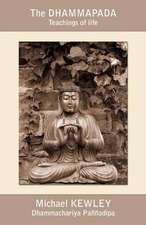Living Yogacara: An Introduction to Consciousness-Only Buddhism
Autor Tagawa Shun'ei Traducere de Charles Mulleren Limba Engleză Paperback – 31 mai 2009
Yogacara Buddhism was unable to sustain the same level of popularity as other Buddhist schools in India, Tibet, and East Asia, but its teachings on the nature of consciousness profoundly impacted the successive developments of Buddhism. Yogacara served as the basis for the development of the doctrines of karma and liberation in many other schools.
In this refreshingly accessible study, Tagawa Shun'ei makes sense of Yogacara's subtleties and complexities with insight and clarity. He shows us that Yogacara masters comprehend and express everyday experiences that we all take for granted, yet struggle to explain. Eloquent and approachable, "Living Yogacara" deepens the reader's understanding of the development of Buddhism's interpretation of the human psyche.
Preț: 69.01 lei
Preț vechi: 82.40 lei
-16% Nou
Puncte Express: 104
Preț estimativ în valută:
13.20€ • 13.82$ • 10.93£
13.20€ • 13.82$ • 10.93£
Carte disponibilă
Livrare economică 17-24 martie
Livrare express 28 februarie-06 martie pentru 34.59 lei
Preluare comenzi: 021 569.72.76
Specificații
ISBN-13: 9780861715893
ISBN-10: 0861715896
Pagini: 150
Dimensiuni: 150 x 226 x 5 mm
Greutate: 0.27 kg
Editura: Wisdom Publications (MA)
Locul publicării:United States
ISBN-10: 0861715896
Pagini: 150
Dimensiuni: 150 x 226 x 5 mm
Greutate: 0.27 kg
Editura: Wisdom Publications (MA)
Locul publicării:United States
Notă biografică
Tagawa Shun'ei is the abbot of Kofukuji in Nara, the head temple of the Hosso school of Japanese Buddhism.
Descriere
While Yogacara Buddhism did not endure on a major scale as a distinct tradition in India, Tibet, and East Asia, its teachings on the nature of consciousness made a profound impact on the forms of Buddhism that developed in those regions, and served as the basis for the development of the doctrines of karma and liberation in many other schools. Part of the reason for Yogacara's failure to achieve enduring popularity is no doubt the perception that its complex system of viewpoints, paths, and categories is difficult to grasp.
Here, Tagawa Shun'ei makes sense of its seeming unwieldiness. He shows what the Yogacara masters are talking about are, in many cases, everyday experiences shared by all, and that the structures of consciousness that they articulated are things we all take for granted but for which we have no real explanation. Eloquent and approachable, Living Yogacara deepens the reader's understanding of the development of Buddhism's interpretation of the human psyche.
Here, Tagawa Shun'ei makes sense of its seeming unwieldiness. He shows what the Yogacara masters are talking about are, in many cases, everyday experiences shared by all, and that the structures of consciousness that they articulated are things we all take for granted but for which we have no real explanation. Eloquent and approachable, Living Yogacara deepens the reader's understanding of the development of Buddhism's interpretation of the human psyche.










